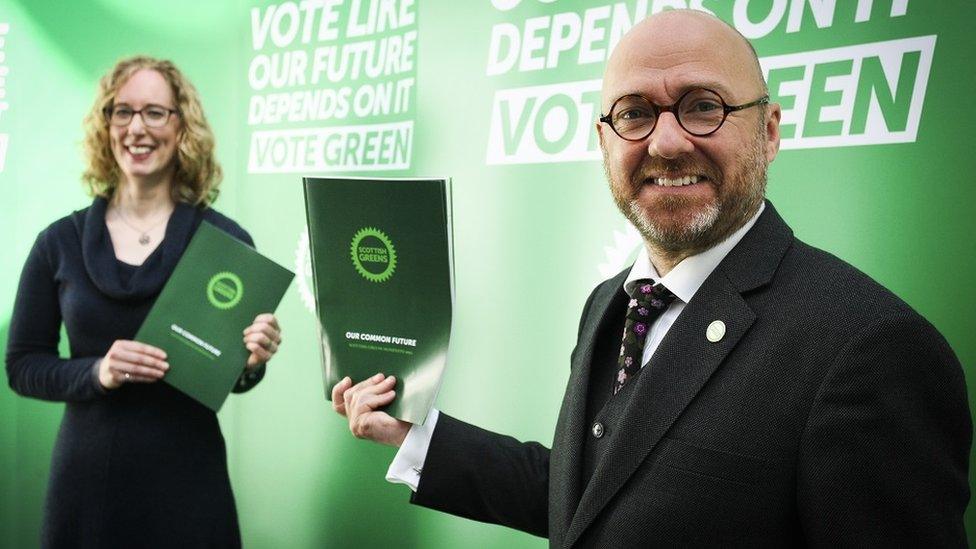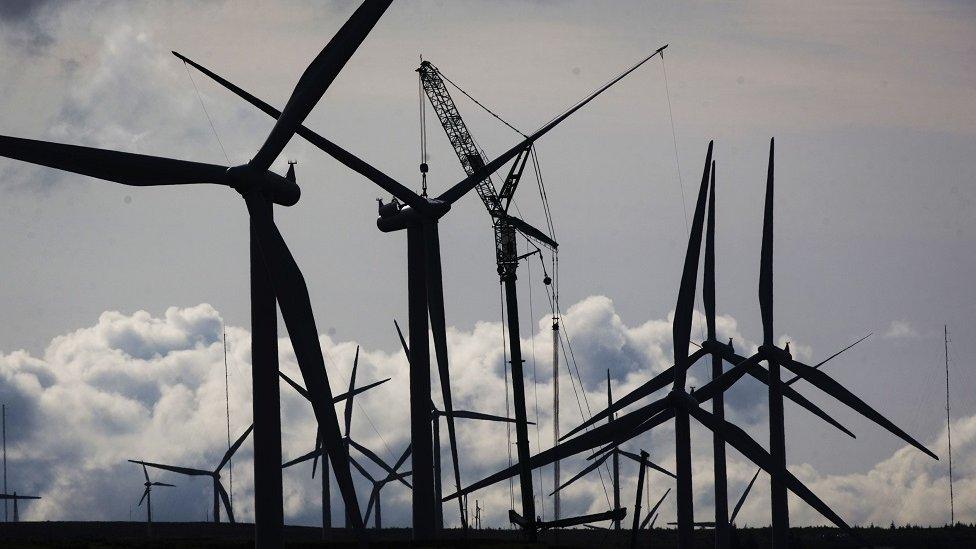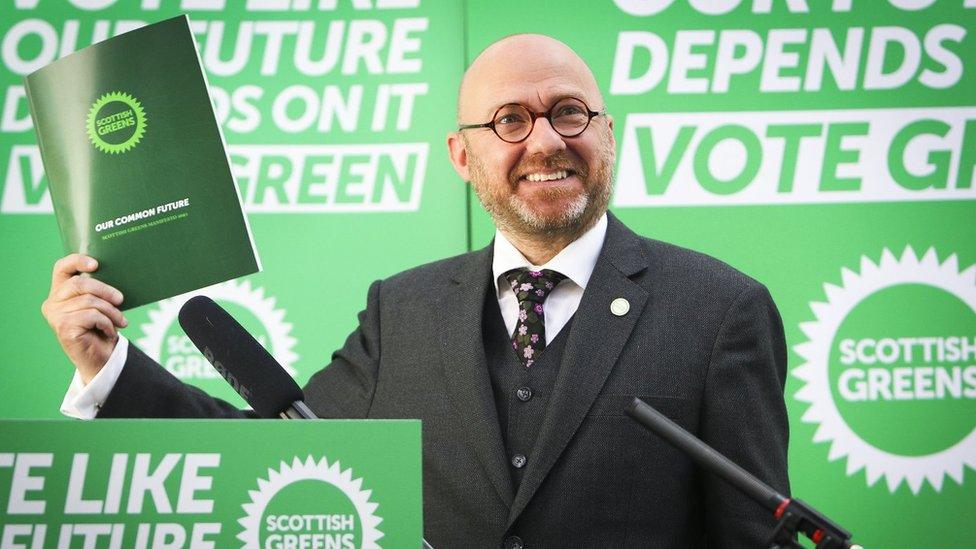Scottish election 2021: Scottish Green Party policies explained
- Published

Scottish green co-leaders Lorna Slater and Patrick Harvie took part in a manifesto campaign launch
The Scottish Greens have launched their 2021 election manifesto. The full document, external runs to 97 pages. So, what is the party promising? BBC Scotland's correspondents have been analysing the pledges.
1. Fast action on climate change

The problem for the Greens is that their traditional policy areas - which stood them apart from other parties - have become mainstream. The phrase "a green recovery" is being used the world over.
So their manifesto now has to stand out for the speed of that change with an urge to "vote like your future depends on it".
They want a faster rollout of low carbon domestic heating, more money for nature restoration and a bigger investment in our railways.
Setting them apart is a pledge to support the onshore wind sector - which struggled for years since its exclusion from the bidding process - and free bus travel for young people. But environmental policy is now a crowded marketplace.

SCOTLAND ALERTS: Get extra updates on BBC election coverage

2. Create jobs through transition to net zero

There's an expensive shopping list for the Scottish Greens, with bold claims for the number of jobs that could be created through the proposed energy transition. There is less prominence for resulting job losses in the oil and gas industry.
Some of the costs will be for the public, through energy bills. The price of retrofitting homes and big investments in public transport partly comes from spending less on roads or from more tax on aviation.
Overall, there is no attempt to measure the amount of borrowing and extra tax that would be required. But there are some eye-catching proposals for raising funds.
The party sees an opportunity for Westminster to tax windfall company profits on retailers who have prospered. It also wants to shift the tax burden towards wealth, with a tax on assets above £1m. That would catch as many as a tenth of Scots, through the value of homes and more so through pension pots.
That's another ask of Westminster, though Greens point to Holyrood's powers to create new local taxes. Council tax is already loosely based on asset value. The tax base could be spread wider through local authorities.
With a less ambitious plan for replacing council tax than the Land Value Tax previously proposed by Scottish Greens, and also on frequent flyers, the emphasis remains on reassuring most people they won't pay more.
3. Seamless journeys on public transport

The Greens want big improvements to public transport and active travel, as well as banning the sale of new petrol and diesel cars by 2026.
They want an integrated transport system, to make possible seamless journeys by bus and train - and a greater focus on local communities, so people don't have to commute long distances. But that focus could mean a huge change for drivers.
In addition to ending the sale of new petrol and diesel cars just five years from now, they also want no further expansion of Scotland's road network, and more taxes on workplace parking.
They say they'll give Scotland's councils the power to run bus services "in-house", ending the privatised bus network put in place by Margaret Thatcher in the 1980s. Buses are the most used form of public transport - and the Greens insist they can't be left to the whim of the market.
They also want a low-carbon railway. That could mean electrifying more of the rail network, and a forced retirement for diesel locomotives.
All this, they say, will deliver a jobs bonanza - with 17,000 new construction workers required to build an integrated public transport system.
Earlier this year, the Greens used their influence at Holyrood to force through free bus travel for every under-19. They want this extended to all under 27s, and free train and ferry travel for all young people.
But they want to go much further. Their long term goal is free public transport for all.
4. Indyref2 if there's a majority in favour at Holyrood

There has been much focus on the Green position on the constitution, given their potentially pivotal role in creating a pro-independence majority at Holyrood.
It was certainly the subject of many of the questions at the manifesto launch.
However, based on the manifesto alone, the subject is far from the top of the Green list of priorities - accounting for only two of the 96 pages.
Not much space is really needed, because the party's position is straightforward: there should be an independence referendum during the next Holyrood term if a majority of MSPs want one.
This is a deliberately simple position, with no talk of "supermajorities" or indeed the idea of gathering signatures on a petition proposed by the Greens in 2016. It is easily understood, and will mesh comfortably with whatever position the SNP put forward.
It all looks ahead to the mandate-measuring row which looks set to follow the election, as pro-independence parties seek to box the UK government into backing a new referendum.
5. Pay rises for health and social care workers

The Scottish Greens say they want social care workers to be paid at least £15 an hour, and a pay increase of 12.5% for nurses, who they say have been undervalued and need time to recover from the pandemic.
Nursing and other NHS staff have already been offered a 4% pay increase by the Scottish government, the highest in the UK. Some unions have urged members to reject it arguing it doesn't take into account years of underpay.
Investment in general practice is also a priority for the Greens. They say investing in GPs would mean 15 minute appointments and the ability to expand the services they can offer, like having mental health clinicians and welfare rights officers in practices.
At the end of the day, paying for all of this will be a major challenge. Over 40% of the entire Scottish budget is spent on the NHS, and even more if you include social care. By far the largest share is spent on staff and so if you want to push that up, something else will have to give.
6. Swap exams for continuous assessment

The Scottish Greens have made no secret of the fact they don't favour exams. The Scottish government's decision to cancel National 5s, Highers and Advanced Highers for two years in a row was not made for academic reasons, but it has opened up the conversation around the best way to measure learning and achievement.
The Scottish Greens say they would support a permanent move towards a model of continuous assessment and get rid of what they call "high stakes, all or nothing exams", which the party argues are not the best way to reflect ability.
The Greens also say they will reform the way the body which runs school exams, the Scottish Qualifications Authority (SQA), is governed. They want at least half of the SQA's board members to be teachers or lecturers and for it to include a young person's and parent or carer's representative. The party argues the organisation needs to rebuild trust following last year's exams fiasco.
7. A 'radical reinvestment' in social security

With one in five living in poverty in Scotland, the Greens want a "radical reinvestment" in social security.
The social security system is largely controlled by Westminster. However, the last parliament saw new powers devolved to Holyrood and a number of new benefits introduced.
The Greens want to double the new Child Payment - given to families on benefits with children under six - and accelerate its rollout.
They also want to ask the UK government to scrap the caps for families with more than two children. And they want to double Young Carer Grants and the Carers Allowance.
There is also a pledge to negotiate with Westminster over a Universal Basic Income pilot scheme for Scotland. Until that is finalised, though, they plan to examine how to use existing powers to establish a Scottish Minimum Income - using social security top-up funds to help families living below the breadline.
8. Tackle sexual harassment and gender based violence

The disappearance and murder of Sarah Everard last month triggered a much wider conversation about the safety of women.
Social media filled up with stories of fear, intimidation, harassment and much worse. Campaigners took to the streets to demand action.
The issue seems endemic. Little wonder then that, when it comes to justice, the Greens have chosen to focus largely measures to tackle sexual harassment and gender based violence.
There are pledges on legal aid for victims of domestic abuse, and the decriminalisation of sex work, alongside increased funding for organisations supporting victims and a promise to create a Victims Commissioner.
Then there's a commitment to a strategy that will prevent violence against women - with education at its centre. Acknowledgement of campaigners' calls for early intervention, and an admission perhaps that on this issue, there is no quick fix.

POLICIES: Who should I vote for?
CANDIDATES: Who can I vote for in my area?
PODLITICAL: Updates from the campaign



Do you have a question about the Scottish Parliament election? Use the form below to send us your questions and we could be in touch.
In some cases your question will be published, displaying your name, and location as you provide it, unless you state otherwise. Your contact details will never be published. Please ensure you have read the terms and conditions.
If you are reading this page on the BBC News app, you will need to visit the mobile version of the BBC website to submit your question on this topic.

- Published14 April 2021

- Published14 April 2021

- Published14 April 2021
